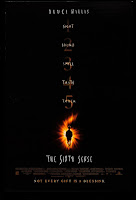Ghosts
are everyone’s first exposure to the horror genre, unless you came from weird
parents that didn’t let you watch Scooby
Doo as a child. Despite the proliferation of Vampires and Zombies, ghosts
and ghost stories remain the most prolific (and oldest?) form of horror story.
Even children’s picture books include stories about ghosts. They are,
figuratively (or literally) everywhere, depending on your beliefs.
Maybe
because ghost stories are so commonplace, it’s easy to dismiss them as “not
that scary” or effective as a vehicle for blood-curdling horror. I, of course,
disagree with that. In fact, I think ghosts are the most versatile means of
scaring the bejeezus out of someone.
A
good ghost story, in print or film, should linger long after you’ve finished
it, like too much garlic in a pasta salad. Done well, a good ghost story will
have you questioning your perceptions of what constitutes reality. And it
doesn’t hurt if it makes you not want to sleep for three days, either.
 |
| The American version, actually a creepier poster. |
5. The
Ring (1998) and (2002)
This
is another Japanese import—really, the first one that started it all. You
probably already know of the plot: anyone who watches the whacked out images on the video
tape will die shortly after seeing it. It’s a goofy-sounding premise, until you
see it (and the techno-lich that comes to claim the people) in action. Then
you’re reaching for the lights, because it’s truly disturbing on many levels.
The
visuals in this film are amazing. When the supernaturalness shows up, it’s
brilliantly done. However, what’s missing for me is a little bit of
explanation. Is the tape haunted? Or does the tape summon the unquiet spirit?
It’s all confusing, and I suspect, the clarity got lost in the translation.
When it was remade in 2002, they provided some needed scenes that contextualized
for me what was probably implicit in the original film if you were a native
speaker of Japanese or culturally immersed. But what the American version adds
in explanation, it takes away in alien, unknowable horror. The best version of
the movie is somewhere between the two films.
Based
partially on Henry James 1898 novel, The
Turn of the Screw, The Others
plays fast and loose with the premise while keeping the original idea of
paranoia, insanity, and uncertainty about the truth of everyone’s perceptions. A
young woman and her two sick children are left alone in the large, creepy
family house, and she gradually becomes convinced that the house is haunted,
and in particular, targeting her children.
Nicole
Kidman brings home the fear and paranoia and the helplessness of being unable
to leave her home, and yet terrified by what’s inside of it. The ending wasn’t quite
as twisty as The Sixth Sense’s big shocker, perhaps because it had premiered
two years prior to this movie, but it’s still an effective and creepy ghost
story that will keep you thinking and guessing.
3. The
Sixth Sense (1999)
Released
the same year as the terrible remake of The Haunting, this is the movie that made
a superstar out of M. Night Shyamalan (and kept him in the limelight for
probably far longer than usual). And with good reason. This is easily his best
film, and it’s also a cracking good ghost story with a terrific Serling-esque
twist at the end. Even if everyone knows it now, at the time, it was quite the
mind-blower, especially since Shyamalan plays fair with the audience throughout the movie.
What
makes this movie so good is that the ghosts, even as they are “pictures that
can’t hurt us,” are still genuinely frightening because of how Shyamalan portrays them. They appear suddenly, look genuinely haunted, and once we get to know Cole better, we find out
they are all around him. The few creepy glimpses we have into Cole’s worldview are
well-done. The Sixth Sense is not intensely scary during the watching of the
movie, but it is certainly pervasively unsettling enough to make you reluctant to turn off the light at night.
2. Insidious
(2010)
Well,
if you’re going to re-do a “done to death” genre, here’s a good way to do it.
Director James Wan (who gave us the first Saw
movie) takes a few good whacks at a ghost story with a meat cleaver and manages
to make a pretty good gumbo. The plot of
the movie bears more than a general resemblance to Poltergeist, probably because that’s become such a template:
average American family + creepy old house – one of the children = dramatic
tension we’re all emotionally manipulated into caring about.
Thankfully,
Insidious makes new assumptions and comes to new conclusions around this creaky old chestnut of a plot and serves up some
genuinely disturbing imagery and a nice combination of jump scares and
psychological moments to keep this movie rolling. Granted, Insidious covers no
new ground, but it re-imagines things in a fresh way that make me all squirmy
inside.
A
grieving solicitor is given one last chance to keep his job, and is sent into
the country to examine the legal documents surrounding the Eel Marsh House, now
in receivership. What starts out as a cold reception from strange and
standoffish locals soon turns into a mystery surrounding murdered children and a
village held hostage by a mysterious woman in black…
This
latecomer from the newly-reinvigorated Hammer Studios features a post-Harry
Potter Daniel Radcliffe, determined to distance himself from the most famous
screen role in the 21st century and doing a bang-up job of it. This
gothic suspense thriller is an exceptional example of that particular sub-genre
done right; a heady mix of atmospheric thrills, claustrophobic camera angles,
psychological misdirection, and for the payoff, a truly terrifying ghost. This fantastic
thriller shares more in common with the classic The Haunting (1963) than some of Hammer’s bodice-ripping antecedents in
terms of the mental territory it stakes out.




